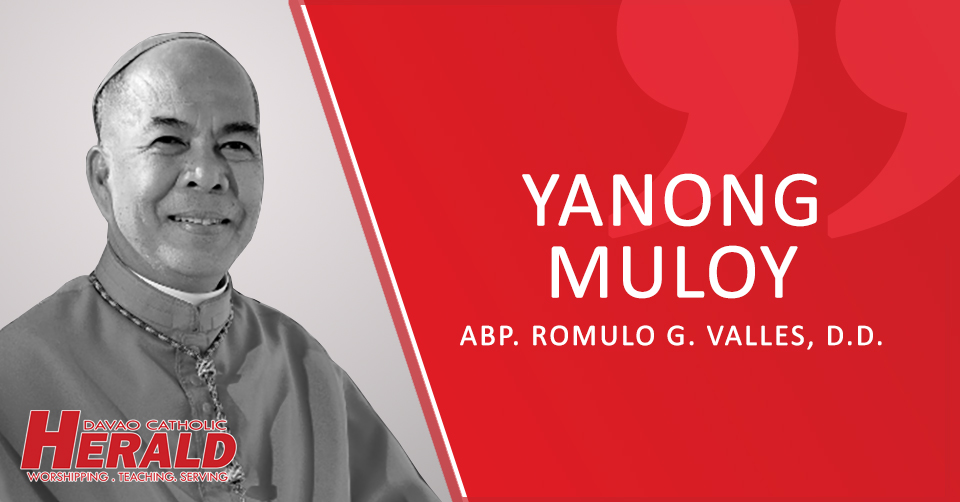
Pastoral Advisory #12: Pastoral Considerations coming from Executive Orders No. 57 and No. 58 from the City Government of Davao
Archdiocese of Davao
28 October 2020
A. Executive Order No. 57: An Order Regulating Mass Gatherings and Prohibiting Non-Essential Travel Within Davao City and for Other Purposes until December 31, 2020
(Issued on 26 October 2020; took effect at 5:00 a.m. on 27 October 2020)
- Section 8 says:
Cemeteries and Funeral Parlors. Executive Order No. 52 is reiterated. For our guidance, we have already said something about this; please refer to Pastoral Advisory # 6 and Pastoral Advisory #11. - Section 9 says:
Places of Worship. All places of worship must increase the spaces between their members to two (2) meters, there must be no singing and unnecessary chatting among individuals. Members who are below 21 years old, 60 years old and above, those with immunodeficiency, comorbidity, other serious health risks and pregnant women are prohibited from attending worship and must be provided with online, radio or television prayer opportunities. On No Singing During Worship: We sought clarification from the City Government and this means basically as “no group singing” during worship celebrations.Please remember that in our previous Pastoral Advisory (Pastoral Advisory #8 dated 20 May 2020), we have said something about singing during our liturgical celebrations:
Keeping Masses Short. Keeping the celebration of the Mass short and simple. This means keeping to the minimum the singing in/of some parts of the Mass. These Masses could be pictured out as similar to most of our daily Masses before, that is, during normal times: having no full choir assisting the liturgy but only having a cantor to lead the assembly to sing very common hymns.
Thus, we give these following pastoral guidelines:
- We can celebrate our Masses in recited form, that is, we just recite the many parts of the Mass that we usually sing. We remember doing this after we issued our Pastoral Advisory #8 on 20 May 2020.
- We may also have one cantor to sing some parts of the Mass. But this means that the cantor sings for the congregation, and not in such a way that would invite the congregation to sing, and therefore leading into group singing in the liturgy. An announcement can be made about this to make our people aware of the situation.
- Instrumental music can be played by an accompanist, playing the organ for example, providing instrumental music for some parts of the Mass, like the entrance or the preparation of gifts or communion. But care should be taken that this instrumental music is played in such a way that would not invite people to sing.
- And the three (3) above-mentioned options can be combined, depending on the creativity of the parish music ministry.
On Vulnerable Age and Vulnerable Sector:
In this Executive Order No. 57, the vulnerable age is defined as those below 21 years old, and 60 years old and above. And this Executive Order explicitly says that they and others considered vulnerable “are prohibited from attending worship”.
In our previous Pastoral Advisory on this issue (Pastoral Advisory #8, A, 4 dated 20 May 2020), it is stated that “The attendance of the elderly, those who are sickly, and children at Masses is discouraged.”
In another earlier Pastoral Advisory concerning our elderly lay volunteers (Pastoral Advisory #11 dated 8 October 2020), we said that “Many of our EMHCs and volunteer parish workers are elderly and therefore are vulnerable to the virus. Care is to be exercised in this regard not to expose them to the infection of the virus.”
We can see that the words we used are, they are discouraged to come and attend liturgical celebrations. Also, for lay volunteers, we said, “care to be exercised” in their volunteer participation in the various ministries in the parish. Whether they be allowed to continue to serve or not, we said in our Pastoral Advisory (Pastoral Advisory #11) that “we leave the decision to the wise and prudent judgment of the parish priest”.
Now, in this recent Executive Order No. 57, it is indicated that the people in this vulnerable sector “are prohibited from attending worship”. And if they are prohibited from attending worship, by strong implication, their coming to do volunteer work is included.
Thus, the issue of allowing or not our elderly lay volunteers to continue their services is now clearly guided by this recent Executive Order.
B. Executive Order No. 58: An Order Defining Vulnerable Age and Vulnerable Sector Following the Provisions of IATF Resolution No. 79
(Issued on 27 October 2020; tooke ffect immediately)
- Section 1 says:
Vulnerable Age. Individuals that are below 18 years old and above 65 years old. - Section 2 says:
Vulnerable Sector. Individuals below 18 years old and above 65 years old, those with immunodeficiency, co-morbidity, other serious health risks and pregnant women. We are taking notice of this Executive Order because in the previous Executive Order mentioned above (EO #57), the vulnerable age is defined as those “below 21 years old, 60 years old and above”.Now, please pay attention to the change given in Executive Order No. 58. The vulnerable age is now “individuals that are below 18 years old and above 65 years old”.
We are giving attention to this item because it has something to do with who are considered in the vulnerable sector and we have many of them, as we know, giving voluntary work in our various parish ministries.
Should there be any other questions or queries, please refer to the Chancery Office of the Archdiocese of Davao.
With my fraternal blessing, I remain
Sincerely yours in Christ,
+ ROMULO G. VALLES, D.D.
Archbishop of Davao


No Comments